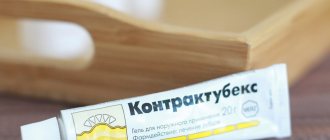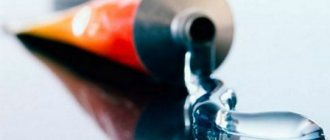From this article you will learn:
- analysis of the composition of the drug Effezel,
- instructions for use,
- reviews of Effezel gel from dermatologists.
Effezel gel is a medicine for external use against acne, which contains a combination of active ingredients (retinoid adapalene 0.1% + antimicrobial component benzoyl peroxide 2.5%). The drug belongs to the Swiss company, which specializes in the production of drugs for the treatment of skin diseases and is known to dermatologists all over the world. It is she who produces such drugs for the treatment of acne as Differin and Baziron AS.
Reviews from dermatologists about Effezel gel are quite clear - it is the first choice drug in treatment regimens for papulopustular acne (pimples). The clinical effectiveness of the combination of 0.1% adapalene and 2.5% benzoyl peroxide has been confirmed by the FDA and is recommended by this organization for the treatment of acne. It is worth considering that, according to the instructions, the drug Effezel is a prescription drug and can only be used in patients over 9 years of age.
Photo of Effezel gel packaging –
Prescription supplies should not confuse you, because... this is due to the peculiarities of registration of the drug. For example, the drugs “Differin” with adapalene 0.1% and “Baziron AS” with benzoyl peroxide 5% (this is twice as much as in the drug Effezel) are available over the counter. In this article we will talk about the features of using this drug, as well as for what forms of acne - it must also be combined, for example, with an antibiotic.
How much does Effezel gel cost in pharmacies, analogues:
For Effezel gel, the price in pharmacies starts from 1300 rubles and up to 1900 rubles (the price is indicated for 2021). This drug also has an analogue with a completely identical composition, which is sold under the brand name Epiduo. This generic is produced in India, but the price for it will not be less than 3,000 rubles (apparently because at the moment it does not have a Russian registration certificate, i.e. it is imported illegally).
An alternative to the combined Effezel gel is to buy two single preparations. These are the drugs Baziron-AS (with benzoyl peroxide 2.5 or 5%) + the drug Differin (with adapalene 0.1%), each of which will cost you between 800 and 900 rubles, respectively. On the one hand, it may not be cheaper, but on the other hand, it will allow you to use a gel with benzoyl peroxide in the morning, and a gel with the retinoid adapalene in the evening. This separate application will result in less risk of skin irritation.
Indications for use of Effezel-gel –
The instructions indicate that the drug belongs to the pharmacotherapeutic group of drugs intended for the treatment of acne. But this is not entirely correct. The term acne implies that the patient has only white or blackheads - they are also called closed or open comedones (Fig. 4-5). Comedones are non-inflammatory elements of acne, and therefore the use of antimicrobial agents (such as benzoyl peroxide) is not only pointless, but may even be harmful.
White and blackheads (comedones) –
Prescribing Effezel-gel for acne will be harmful because benzoyl peroxide has a fairly pronounced irritating effect. This can be especially pronounced in patients with dry and/or sensitive skin, as well as in the first weeks after starting to use the drug (until the skin gets used to benzoyl peroxide). Therefore, the gel can lead to increased dryness of the skin and, on the contrary, provoke an exacerbation of acne.
The use of the antimicrobial component benzoyl peroxide (together with the retinoid adapalene) is justified precisely in the presence of inflammatory elements, for example, papules and pustules. You probably know that there are 2 types of acne. Firstly, they can be in the form of pustules (these are classic pimples with pus inside), and secondly, in the form of papules without pus. Papules have this peculiarity: they can disappear without a trace, or they can transform into pustules.
Pimples in the form of papules and pustules -
Thus, the indication for the use of Effezel gel is actually not acne, but the papulopustular form of acne (i.e. pimples). Moreover, if the patient’s inflammatory elements are represented predominantly only by papules, we will prescribe the drug Effezel as monotherapy, and this will be enough. But if the patient has pustules with pus, then Effezel alone will not be enough in this case. And in this case, we will need to prescribe combination therapy to the patient.
Effezel gel for external use 1mg/g+25mg/g 30g with dosing device
Active substance
benzoyl peroxide
ATX code
D10AD53 (Adapalene in combinations with other drugs)
Pharmacotherapeutic group
Acne rash treatment
pharmachologic effect
Absorption of adapalene through the skin is very low (about 4% of the applied dose). Excretion from the body occurs mainly through bile.
Skin penetration of benzoyl peroxide is low. It is completely converted into benzoic acid, which is quickly eliminated from the body.
Indications for use
Treatment of acne with comedones, papules and pustules.
Dosage
Externally.
Apply a thin layer with your fingertips to the entire affected surface 1 time/day in the evening on clean and dry skin, avoiding contact with eyes, lips, mucous membranes and corners of the nose.
The therapeutic effect develops after 1-4 weeks of treatment. The duration of treatment should be determined by the physician based on the patient's clinical condition.
If signs of skin irritation appear, it is recommended to use non-comedogenic cosmetics with a moisturizing effect; depending on the degree of skin irritation, the number of applications can be reduced (for example, every other day), treatment can be temporarily suspended until signs of irritation disappear or completely stopped. Resumption of treatment is possible after consultation with a doctor.
Contraindications
Hypersensitivity to the active substances of this combination; children up to 9 years old.
Side effects
From the side of the organ of vision:
unknown - swelling of the eyelids.
From the respiratory system:
unknown - feeling of constriction in the throat.
For the skin and subcutaneous tissues:
often - dry skin, contact dermatitis, skin irritation, burning sensation of the skin, erythema, peeling of the skin, rash; infrequently - itching, sunburn; unknown - allergic contact dermatitis, facial swelling, skin tenderness (tingling sensation), blisters (vesicles).
Overdose
No interaction studies have been conducted with other drugs.
Based on existing experience with the use of adapalene and benzoyl peroxide, interactions with other drugs have not been identified. However, other retinoids or benzoyl peroxide, or drugs with a similar mechanism of action, should not be used at the same time. Caution should be exercised when simultaneously using cosmetics with exfoliating, irritating or drying effects due to possible additional irritant effects.
The absorption of adapalene through the skin is low, so the development of interactions with systemic drugs is unlikely.
The penetration of benzoyl peroxide through the skin is low, it is completely metabolized to benzoic acid, which is quickly eliminated from the body. In this regard, the interaction of benzoic acid with systemic drugs is unlikely.
Special Instructions
Do not apply a drug containing this combination to skin damaged due to injury (cuts or abrasions) or eczematous changes.
Avoid contact with eyes, mouth, nostrils and other mucous membranes. If the drug gets into your eyes, rinse them immediately with warm water.
During treatment, avoid excessive exposure to sunlight or UV radiation.
Effezel gel: instructions for use
Effezel gel is for external use only. Externally, the gel has a white or light yellow color and is not transparent. In pharmacies, this drug can usually be purchased only in tubes of 30 g. The pharmacological effect of Effezel gel is due to the presence of 2 active components in the composition. Firstly, it is adapalene, which belongs to the 3rd generation topical retinoids, and secondly, it is a highly effective antimicrobial component “benzoyl peroxide”.
Gel composition (in terms of 1 g):
| Active substances: → adapalene 0.001 g (corresponding to 1.0 mg or 0.1% concentration), → benzoyl peroxide 0.025 g (corresponding to 25 mg or 2.5% concentration). |
| Excipients: simulgel 600 RHA (it contains a copolymer of acrylamide and acryloyldimethyl taurate 35-40%, isohexadecane 20-25%, polysorbate-80 5-10%, sorbitan oleate 2.5%, and water up to 100%) – 0.04 g, sodium docusate 0.0005 g, disodium edetate 0.001 g, glycerol 0.04 g, poloxamer-124 - 0.002 g, propylene glycol 0.04 g, purified water - up to 1 g. |
→ Gel Effezel official instructions (PDF)
How to apply the drug correctly. What course of treatment?
Effezel gel is applied to the affected areas of the skin in a thin layer using your fingertips. The drug should be used only 1 time per day (preferably in the evening before bedtime). First you need to thoroughly clean the skin with a mild detergent and dry it well. If you apply the gel to skin that is not completely dry, you will get severe irritation. The duration of treatment depends on the specific situation and is determined by the doctor individually.
At the very beginning of using the drug, dryness, redness, irritation, burning or itching of the skin may occur. If such symptoms occur, you should take a break from treatment for several days, after which you should start using the drug only 3 times a week for 1 or 2 weeks (this will allow the skin to get used to adapalene and benzoyl peroxide). Also, to reduce the risk of facial skin irritation, it is advisable to use products to moisturize it, but it is very important that they are non-comedogenic.
When you see the result - usually the first improvement in the condition of your facial skin can be noticed within 7-10 days (in some patients up to 4 weeks). The standard course of treatment is about 3 months, however, if a good therapeutic effect is achieved, the drug can be discontinued earlier, and in its place a single drug with a topical retinoid adapalene 0.1% (this can be Differin or Clenzit) is prescribed. In any case, the decision to discontinue or replace the drug should be made only by a dermatologist.
Effezel gel: reviews from dermatologists
We have already said above that reviews of effezel gel are confirmed only by the fact that drugs containing adapalene 0.1% and benzoyl peroxide 2.5% are recommended by the FDA (the most famous organization in the world for monitoring the quality and effectiveness of pharmaceuticals).
This is a really working drug, and below we will talk about the schemes for its use. However, this will not be a very good drug for patients with sensitive and dry skin, because... it is highly likely to irritate their skin and possibly worsen their acne symptoms. The fact is that both the topical retinoid adapalene and the bactericidal component benzoyl peroxide have an irritating effect on the skin, even separately. You can somewhat reduce the risk of irritation if you divide the application of adapalene and benzoyl peroxide over time, but for this you already need 2 single preparations. For example, you will apply the drug Baziron with 2.5% benzoyl peroxide (once a day, in the morning), and in the evening before bed - the drug Differin with 0.1% adapalene, and for patients with dry and sensitive skin it is better to choose a form in the form cream, not gel.
International protocols for the treatment of acne (pimples) –
Let us remind you once again that we do not use Effezel gel for acne. This drug is indicated only if you have inflammatory elements on your skin - papules, pustules or nodes. Those. the indication for use of the drug is papulopustular acne of any severity (we call it pimples), however, there are several nuances (24stoma.ru). These nuances relate to differences in treatment regimens - depending on the severity of acne, as well as on the predominant type of inflammatory elements.
The treatment regimens described below are taken from the famous textbook on dermatology “Fitzpatrick's Dermatology”, which is the most authoritative publication for dermatologists around the world. Treatment regimens take into account the “treat according to clinical manifestations” strategy (UpToDate 2009), i.e. which inflammatory elements are predominant in the patient.
1) Papulopustular acne of mild to moderate severity - if you have only papules without pus as inflammatory elements, then in this case monotherapy with the drug Effezel (or its analogue Epiduo) is sufficient. However, we have already said that it is not necessary to use one combination drug, and it is quite possible to replace it with 2 single drugs. The drug with benzoyl peroxide is applied in the morning, and with the retinoid adapalene in the evening.
But if you have papules with pus, then the use of an antibiotic is already mandatory. In this case, we prescribe a gel with clindamycin in the morning (this could be the drugs Dalacin, Clindavit, etc.) + Effezel gel in the evening. Why do we use two antimicrobial components at once in this case - an antibiotic and benzoyl peroxide. The fact is that with pustules with pus, the antibiotic will be the main antimicrobial component, but benzoyl peroxide is prescribed so that the P. acnes bacteria do not develop sensitivity to antibiotics.
2) Severe papulopustular acne - if you have severe forms of acne, then an antibiotic is prescribed only orally for a long course of up to 6-8 weeks. In parallel with this, we will prescribe the patient Effezel in the evening before bed.
Effezel
Effezel is a medicine for the treatment of acne (acne). Acne or acne vulgaris is one of the most common diseases in dermatology. This problem is especially relevant for adolescents and young people aged 14 to 25 years, including acne, incl. More than 80% suffer from its serious forms. Not all of them seek medical help, because... believe that acne is a cosmetic problem that can be solved on your own. At the same time, patients often make increased demands on drugs for the treatment of acne, implying an immediate onset of effect, while for the doctor the severity and stability of the achieved result and the minimum likelihood of developing side effects are fundamental. There is a drug that meets the requirements of both: Effezel, which contains two active components: adapalene and benzoyl peroxide, and does not have hormonal ingredients. Adapalene promotes the rapid elimination of existing acne elements and prevents the occurrence of new ones. Both components exhibit an anti-inflammatory effect, and adapalene also has an immunostimulating effect. Benzoyl peroxide, in turn, is an effective antibacterial agent, highly active against Propionibacterium acnes, microorganisms that cause acne. Benzoyl peroxide does not cause the development of tolerance in bacteria, so the drug can be used for a long time without the risk of weakening its effectiveness.
The action of Adapalene is in many ways similar to retinol: it reduces the severity of inflammation, controls the intensity of exfoliation of dead skin cells and the processes of cell proliferation, i.e. acquisition of chemical, morphological and functional characteristics. Benzoyl peroxide also accelerates the exfoliation and destruction of horny substance. Effezel is able to quickly eliminate the signs of acne and maintain the achieved effect for a long time, because acts not only on the manifestations, but also on the mechanism of development of the disease. Effezel is easy to use, which increases compliance (adherence to treatment). The frequency of use of Effezel gel is 1 time per day. The active ingredients of the drug are practically not absorbed into the systemic circulation, which minimizes the risk of unwanted side effects. The drug can be used in any phase of the development of the disease. Effezel is well tolerated. One package is enough to carry out a full course of medication lasting three months. In the case of acne, it is necessary to take into account the psycho-emotional side of the issue, because This disease brings serious moral suffering to a person. Effezel will help cope with the problem of acne in the shortest possible time with minimal risk of recurrence of the disease.
Side effects and contraindications –
Symptoms of skin irritation may appear - this may include dryness, flaking, redness, as well as itching and burning. Usually such symptoms disappear after 1-1.5 weeks. According to the manufacturer’s recommendations, if such symptoms appear, it is advisable to reduce the number of gel applications (apply it every other day, not every day), and also begin to simultaneously use skin moisturizers.
But to prevent side effects, we recommend using such moisturizers from the 1st day of therapy. In addition, while using Effezel, you should not use other products containing retinoids, benzoyl peroxide or drugs with similar effects, as well as cosmetics with an irritating and drying effect, containing alcohol, as well as peelings, scrubs, etc. And besides, you will need to be sure to use sunscreen with SPF 50, which must be non-comedogenic.
An example of a product with SPF 50 for patients with acne (suspension) –
Absolute contraindications –
- during pregnancy (if breastfeeding is possible),
- in children under 9 years of age,
- if you are allergic to one of the components of the drug.
Dermatitis and eczema are relative contraindications (use with great caution).
Special instructions for use –
- the drug should not be applied to skin that has abrasions and scratches,
- should not be applied to the mucous membranes and red border of the lips,
- avoid getting the gel in your eyes,
- Keep in mind that upon contact with dyed hair and clothing, Effezel causes discoloration. We hope you found the article useful!
Sources:
1. Textbook on dermatology “Fitzpatrick's Dermatology” (8th edition), 2. “Etiology, pathogenesis, classification and clinical picture of acne vulgaris” (Barinova A.N.), 3. “Acne from the position of evidence-based medicine” (Anisimova M. .Yu.), 4. “Modern methods of treatment and rehabilitation of patients with acne vulgaris” (Barinova A.N.).


